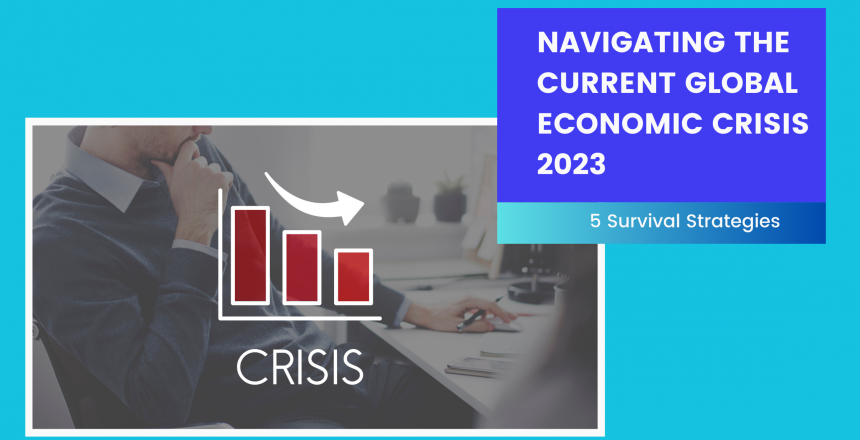Current Global Economic Crisis 2023
The world is currently grappling with a global economic crisis that has created uncertainty and challenges for individuals and businesses alike. In times of economic turbulence, it is crucial to adopt a proactive and resilient mindset. Life coaching can offer valuable insights and strategies to help individuals navigate through these challenging times. In this article, we will explore five survival strategies, informed by life coaching principles, to help you not only survive but thrive in the midst of the current global economic crisis.
5 Survival Strategies
- Embrace a Growth Mindset: During an economic crisis, it is easy to succumb to fear and negativity. However, adopting a growth mindset is essential for survival. A life coach can help you shift your perspective and focus on opportunities rather than obstacles. Embrace a mindset that sees challenges as learning experiences and setbacks as steppingstones toward growth. By developing a growth mindset, you can cultivate resilience and adaptability, enabling you to find innovative solutions and seize new opportunities even in difficult times.
- Assess and Refine Your Goals: The current economic crisis may require you to reassess your goals and adapt them to the changing circumstances. A life coach can assist you in clarifying your priorities and creating a strategic action plan. Take time to evaluate your short-term and long-term goals, considering factors such as financial stability, career prospects, and personal development. By refining your goals, you can create a roadmap that aligns with the evolving economic landscape and helps you stay focused and motivated.
- Cultivate Financial Resilience: In times of economic crisis, financial stability becomes paramount. A life coach can provide guidance on managing your finances wisely. Start by reassessing your spending habits and identifying areas where you can make adjustments. Create a budget that allows for essential expenses while cutting back on non-essential ones. Look for ways to generate additional income streams or explore new career opportunities. Building an emergency fund and prioritising savings will provide a safety net during uncertain times. A life coach can provide practical strategies and accountability to help you achieve financial resilience.
- Enhance Personal and Professional Skills: Investing in personal and professional development is crucial during an economic crisis. Assess your skillset and identify areas where improvement or new skills would be beneficial. A life coach can help you identify your strengths, weaknesses, and areas of growth potential. Develop a plan to acquire new skills through online courses, workshops, or networking opportunities. By continuously improving and expanding your skillset, you enhance your employability, increase your value in the job market, or open doors for entrepreneurial endeavours.
- Nurture a Supportive Network: During challenging times, having a strong support network can make a significant difference. Surround yourself with positive and like-minded individuals who can provide encouragement, guidance, and practical assistance. A life coach can act as a supportive partner, offering unbiased feedback, accountability, and a source of motivation. Additionally, consider joining professional associations, networking groups, or online communities related to your field of interest. Engaging with a supportive network will not only provide emotional support but also open doors to potential collaborations and opportunities.

How do you deal with your debt?
Managing debt during the current global economic crisis requires a strategic approach and a focus on financial stability. Here are some essential steps to help individuals navigate and manage debt effectively in these challenging times.
- Assess your debt: Start by taking stock of your current debt situation. Make a list of all your debts, including credit cards, loans, and mortgages/bonds. Understand the interest rates, repayment terms, and any potential penalties associated with each debt.
- Create a budget: Establish a comprehensive budget that outlines your income, expenses, and debt obligations. Identify areas where you can cut back on discretionary spending to free up funds for debt repayment.
- Prioritise debt repayment: Prioritise your debts based on interest rates and outstanding balances. Consider focusing on high-interest debts first to minimize the overall interest payments. Paying more than the minimum payment whenever possible can help accelerate debt reduction.
- Negotiate with creditors: If you’re experiencing financial hardship, reach out to your creditors to discuss possible options. Some creditors may be willing to provide temporary payment arrangements or adjust interest rates to alleviate the burden.
- Seek professional advice: Consider consulting a financial advisor or credit counsellor for expert guidance. They can help you create a personalised debt management plan and provide strategies to optimize your financial situation.
- Explore debt consolidation: If you have multiple high-interest debts, consolidating them into a single loan with a lower interest rate can simplify repayment and potentially reduce the overall interest paid. However, carefully assess the terms and fees associated with any consolidation option.
- Focus on financial discipline: Avoid incurring new debts whenever possible. Practice disciplined spending habits and develop a savings plan to create an emergency fund. This will help prevent further reliance on credit during challenging times.

Remember, managing debt requires patience, persistence, and discipline. By implementing these strategies and seeking professional advice when needed, you can regain control of your finances and work towards financial stability even in the face of a global economic crisis.
While a global economic crisis may bring uncertainty, it also presents an opportunity for personal and professional growth. By embracing a growth mindset, reassessing goals, cultivating financial resilience, enhancing skills, and nurturing a supportive network, you can navigate through these challenging times with resilience and determination.
Life coaching provides valuable tools and guidance to help you adapt, overcome obstacles, and thrive, even in the face of adversity. Remember, the crisis is temporary, but the lessons learned, and personal growth achieved during this time can have a lasting impact on your life and future success.
If you feel you need our help, please browse through our offerings or read this article.
Yours in kindness,
Taz Tracy

